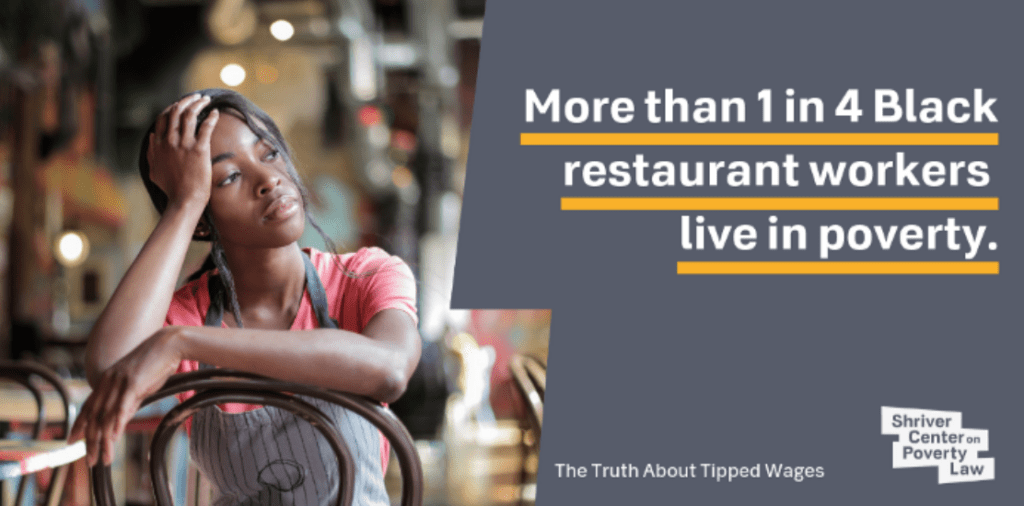Tipping proliferated in the United States after the Civil War, when the restaurant and hospitality industries hired newly emancipated Black women and men but offered them no wage–leaving them to rely on patrons’ gratuities for their pay instead.
August 13, 2019

You’re likely familiar with minimum wages, where workers are paid hourly anywhere from $7.25 (in Georgia, which uses the federal minimum wage) to $15 (in New York City) by employers for their labor. Millions of working people across the United States earn a minimum wage, some making as little as $15,000 annually, and still struggle to meet their basic needs.
You may not be as familiar with the fact that federal and state laws allow employers to pay some workers, generally those who receive tips, less than the minimum wage. The federal tipped subminimum wage has remained at $2.13 per hour since 1991. The Illinois tipped wage is currently $4.95 per hour. This longstanding policy restricts the income of service industry employees like restaurant workers, hair stylists, drivers, and even massage therapists, and makes their labor incredibly cheap for employers. It is also a legacy of slavery.
Tipping proliferated in the United States after the Civil War, when the restaurant and hospitality industries hired newly emancipated Black women and men but offered them no wage–leaving them to rely on patrons’ gratuities for their pay instead. Simply put, tipping was introduced as a way to exploit the labor of former slaves.
“It’s the legacy of slavery that turned the tip in the United States from a bonus or extra on top of a wage, to a wage itself,” explains Saru Jayaraman, co-founder of Restaurant Opportunities Centers United (ROC United).
Tipped workers of color continue to suffer the consequences of this legacy. In the restaurant industry alone, over 27% of Black workers live in poverty. About 37% of tipped workers are mothers, and nearly half of these women are single moms. For a single mother, earning the tipped minimum wage often means going without — going without breaks at work, going without insurance because her employer is not obligated to provide it, going without enough nutritious food to keep her and her family fed and healthy.
While the minimum wage in Chicago is $13, the city’s subminimum wage is less than half: $6.40. Here, tipped workers of color are offered “living wage opportunities” only 53% as often as tipped workers who are white.
While our city, and much of the nation, is fighting for a higher minimum wage, let us also fight for one fair wage — because no one should have to depend on unpredictable tips for a living.
The Raise Chicago Coalition, of which the Shriver Center is a member, has introduced an ordinance that would raise the city’s minimum wage to $15 by July 1, 2021 and phase out the tipped subminimum wage over a four-year period, ending the lower wage by July 1, 2023. Join the fight for fair pay today! Contact your alderman or alderwoman and tell them you support the Raise Chicago ordinance.
Caitlin Sinclair and Reynolds Taylor contributed to this blog.
Follow the Shriver Center’s Medium page for the next installment of our 3-part series The Truth About Tipped Wages.
Everyone should be paid decently and have basic workplace protections.